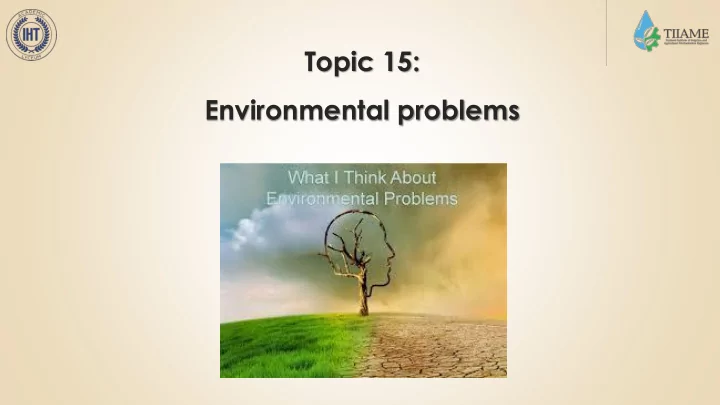

Topic 15: Environmental problems
Climate change is the big environmental problem that humanity will face over the next decade, but it isn't the only one. We'll take a look at some of them — from water shortages and loss of biodiversity to waste management — and discuss the challenges we have ahead of us.
CLIMATE CHANGE MITIGATION AND ADAPTATION Global warming due to CO 2 emissions — which according to the UN have increased by almost 50% since 1990 — is accelerating climate change and threatens the survival of millions of people, plants and animals by causing meteorological events like droughts, fires and floods, which are becoming increasingly frequent and more extreme. This means we need to take measures to mitigate its effects and adapt to its consequences which, even if we keep global warming under 2 ºC as required by the Paris Agreements, will last for centuries.
POLLUTION PROBLEMS AND THEIR EFFECT ON HEALTH The World Health Organization (WHO) estimates that 90% of humanity breathes polluted air, so is calling for a reduction in air pollution to cut rates of respiratory illnesses, thus preventing seven million deaths a year. Contaminated water also causes major health problems and five million deaths a year according to Oxfam Intermón . The UN advocates eliminating dumping, minimising the use of chemicals and treating more wastewater, among other measures.
PROTECTING THE OCEANS The oceans have become the giant waste dumps for plastic. What's more, there are other serious environmental problems related to the oceans such as damage to ecosystems due to global warming, dumping of pollutants, wastewater and fuel spills. The UN calls for improved management of protected areas, giving them sufficient resources, and reducing overfishing, pollution and acidification of the ocean caused by the increase in the earth's temperature.
THE ENERGY TRANSITION AND RENEWABLES While energy accounts for 60% of global greenhouse gas (GHG) emissions, the UN calculates that 13% of the world population lacks access to electricity and that 3 billion people depend on fossil fuels for cooking. This situation requires an energy transition towards a cleaner, more accessible and efficient model based on the use of renewable energy sources to build communities that are more sustainable, inclusive and resistant to environmental problems like climate change.
Waste management, including of technological waste, will be a key issue.
A SUSTAINABLE FOOD MODEL Intensive food production harms the environment by depleting the soil and damaging marine ecosystems. What's more, overexploitation of natural resources has put food safety and the availability of drinking water at risk. The UN considers it essential to change the food production model and our food habits, including a more plant-based diet featuring local ingredients to save energy and reduce CO 2 emissions.
PROTECTING BIODIVERSITY We have already lost 8% of known animal species and 22% are at risk of extinction due mainly to the destruction of their natural habitats, poaching and the introduction of invasive species. The UN has called for conclusive actions to put an end to these threats and conserve our natural heritage, including our increasingly threatened forests.
At present, 22% of animal species are at risk of extinction
The overexploitation of natural resources puts valuable habitats at risk
SUSTAINABLE URBAN DEVELOPMENT AND MOBILITY The growth of cities, which will need to accommodate around 5 billion people by 2030, will be another of the decade's big environmental challenges. The metropolises of the future will need to be compact, safe, inclusive, ecological and energy efficient, with more green spaces, more environmentally friendly buildings and more sustainable methods of transport which put the needs of pedestrians above those of traffic.
Water is vital to species survival and water scarcity already affects millions of people
OVERPOPULATION AND WASTE MANAGEMENT The UN expects the world population to exceed 8.5 billion by 2030, forcing us to considerably reduce the amount of waste we generate through prevention, reduction, reuse and recycling as part of the circular economy, with the aim of minimising the impact on health and on the environment.
5 billion people will live in cities by 2030
EXTREME METEOROLOGICAL PHENOMENA Global warming is causing increasingly frequent, intense and devastating droughts, hurricanes and heatwaves. Keeping temperatures stable, as has been championed in negotiations at the highest level, as well as improving our capacity to respond to climate emergencies, are the keys to minimising the number of these catastrophes, adapting to them, and defending ourselves from them.
HYDRIC STRESS AND WATER SCARCITY The lack of this resource, vital to human, animal and plant survival, affects more than 40% of the world population, and according to the World Economic Forum, agriculture accounts for more than 70% of the water used in the planet's most arid countries. The responsible use of hydrological resources will improve food and energy production, as well as protecting the biodiversity of our water ecosystems and helping us slow climate change.
Choose any of given environmental problems and write your own ideas how to solve it
Recommend
More recommend